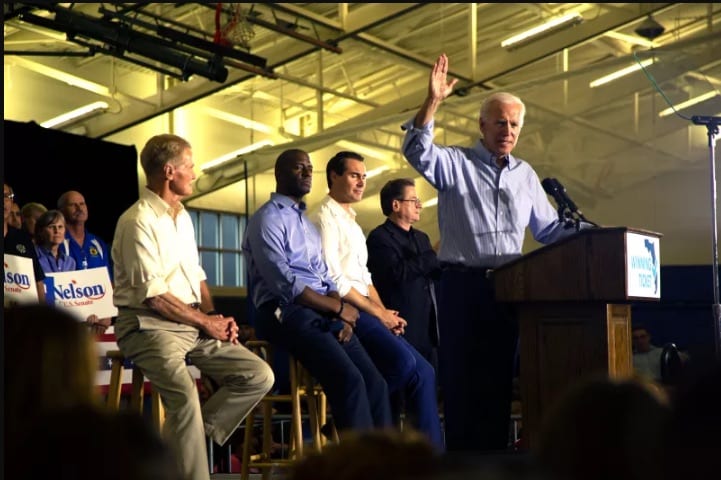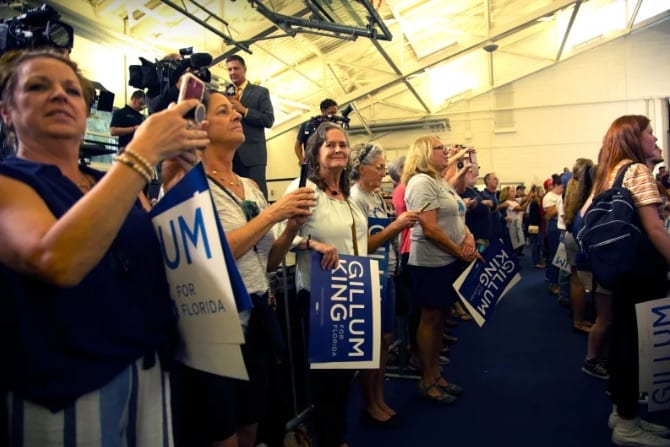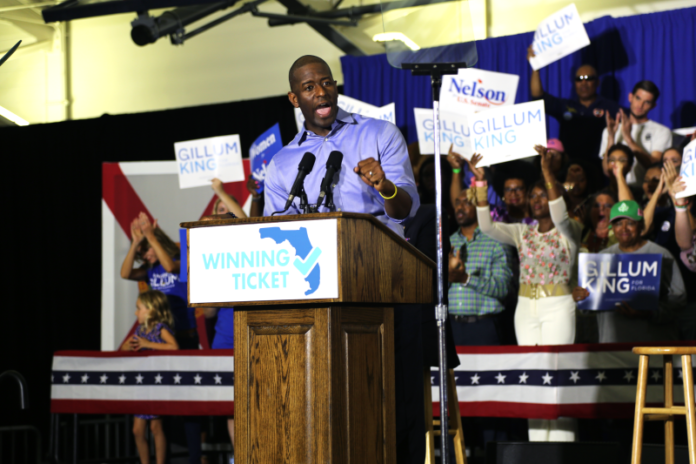By Terrell Jermaine Starr, The Root
JACKSONVILLE, Fla.—Tallahassee Mayor Andrew Gillum isn’t afraid to tell you he is a proud black man. The political implications of being “too black,” long a concern for black candidates running for statewide or higher office throughout U.S. history, don’t scare him. He embraces his blackness because he believes in himself and knows black candidates before him have blazed a trail that makes his approach viable in 2018.
Gillum has already made history by becoming the first African American to win the Democratic nominee for governor in Florida. If he wins next week on Tuesday, he will become one of the handful of black people ever elected governor of a U.S. state.
Because of how race has so frequently been used against black politicians who are aiming for such a high office—Barack Obama had to give his now-famous “race speech” in Philadelphia in 2008 to keep his first presidential run alive—they often had to dial down their blackness to ensure they weren’t turning off white voters. They had to do that even in the face of obvious racial provocations from their political opponents.
Not Gillum.
During his first debate against former U.S. Rep. Ron DeSantis, Florida’s GOP nominee for governor, Gillum highlighted his opponent’s appearances at racist conferences and criticized DeSantis for refusing to return money to a donor who called President Obama a “Muslim nigger.” And Gillum reminded everyone about DeSantis’ “monkey this up” comments, which came the day after Gillum became the Democratic nominee.
“He has only continued, in the course of his campaign, to draw all the attention he can to the color of my skin,” Gillum said in response to DeSantis’ rhetoric. “The truth is, I’ve been black all of my life. So far as I know, I will die black.”
It was a pivotal moment not only during the debate, but for black politics in general. Obama, for instance, was barraged with attacks about his supposedly palling around with terrorists and an out-of-context clip of video of his former pastor screaming “God damn America” that ran on a seemingly endless loop on cable TV. Obama gave his race speech in response. Gillum, 39, reflected on that moment backstage after his rally at the University of North Florida last week, saying that Obama had to walk a much finer line because of his background and position as the first black president.
“He stepped out there as the first and had to try a lot of things for the first time,” Gillum said. “My guess is that he probably had to negotiate a lot of how loud and proud he can be with his race. And he also…had to live his truth. He was raised by a white mother and two white grandparents. There may be some… some realness to how he had to negotiate that space for himself. For me, I am unapologetically black. There ain’t negotiating here. You look at me and you see a black man—a real black man. And when I say real, I don’t mean it as if he’s not. I’m dark-skinned black. I don’t have the luxury of attempting to weave that any differently than what it is.”

Former Vice President Joe Biden speaking at a rally at North Florida University in support of Andrew Gillum and other Democratic candidates on Monday, October 20, 2018.
Photo: Terrell Jermaine Starr (The Root)
Marcus Ferrell, a political strategist who worked on local elections in Florida and served as Bernie Sanders’ 2016 national black outreach director, said that black politicians in Florida historically have gone out of their way to not discuss race because of its relatively small black voting electorate. (Not to mention that many of the 1.5 million residents disenfranchised from voting because of felony convictions are black).
Gillum’s approach, which includes a vigorous fight against “stand your ground” laws, gentrification and calling out racism, may become a blueprint for Democrats if he wins, Ferrell said.
“That’s the difference between Florida right now versus all of the other statewide Democratic races in the past,” Ferrell said. “Andrew is leaning into messages that black people and Latino people can see and feel. It doesn’t take extra money or super huge black outreach operations to automatically get people to be excited about his campaign because he is talking about the things that attract people. For the first time in Florida history, they have someone on top of the ticket who is talking ways to help everybody and he’s not afraid to say, ‘Black’.”
Much of Gillum leaning into his black self comes from his Florida A&M University days. He was always at the top of his class and had numerous AP classes while at Gainesville High School. When he got to FAMU, Gillum realized everyone was at the top of their class and had AP classes under their belts. It was “black excellence on steroids,” he recalls.
“You know the adage of iron sharpening iron? I’m so honored to have had my iron sharpened against some of the brightest most sharpest minds that exist,” he said. “I carried that over into my hiring practices. When I got HBCU applicants, they would immediately rise to the top because I knew what they were of made. I knew their stock because I had come from it. If you can make it there, you can make it anywhere. They would grind harder. They would make a way out of no way, because that’s what an HBCU experience taught us to do.”
When he decided to run for governor, Gillum spoke with his most trusted advisers about how he would broach the subject of race. One of his early supporters, Donna Deagan, a retired, longtime news reporter in Jacksonville, first noticed Gillum in 2016 when he spoke at that year’s Democratic National Convention. Soon after, Deagan sat down with Gillum for more than an hour talking about his platform. Gillum did most of the listening; Deagan did most of the talking. That impressed her. She agreed to support his campaign and is part of his debate preparation team. Deagan portrayed Gwen Graham, his top primary opponent, during his practice sessions.
“I think what his concern was initially, especially when you’re running against a white woman, is that you don’t want to come across as this angry black man,” Deagan said. “It’s always a concern when you’re talking about white people. Black people aren’t allowed to be angry, because you’re black. But if you know Andrew, it really isn’t who he is anyway. So I think he was comfortable being who he was.”
The more Gillum leaned into his blackness and realized it was an asset, the more content he was discussing it. When he is not talking about his HBCU experience at FAMU, he is walking out to his campaign song, “Walk it, Talk It.”
Early on in his campaign, Gillum said he would stand in rooms full of white people and make it plain he was a black man trying to do something that had never been done. That openness would break the ice, freeing people to ask what they were already wondering anyway: “Do you think the state of Florida is ready for a black man?”
“You know when you have a friend, and you don’t really know how real friendly you are until you have insulted them and seen how they dealt with that, or said something a little sideways and you’re not sure how they’re going to react to it?” Gillum explained. “We’ve now done that. We pressed that button and we can now go further. For me, it’s a little bit of allowing a deeper relationship to then take place once I remove that elephant.”
His forthrightness about race hasn’t hurt in him the polls. Early polling had Gillum in a tight race with DeSantis; he was five points ahead in a recent New York Times/Siena College poll. Democratic political activists and strategists in Florida are banking on his history-making run and authentic blackness to turn out black people who were as energized by Obama’s 2008 presidential run. According to the Tampa Bay Times, even though Graham won more counties overall, Gillum won the counties with the highest percentage of black Democrats, giving him his three-point victory. Democrats here think he can flip some of the more conservative-leaning parts of northern Florida, especially Duval County. Trump edged Hillary Clinton by a mere 1.4 percentage points.
Indeed, he knows he will need black votes—lots of them—if he is to win Tuesday night. But he must also convince enough non-progressive voters that his economic policies will benefit all Floridians. There is no personal income tax in the state of Florida, but that hasn’t stopped his opponents from accusing him of wanted to introduce it. He wants to raise the corporate tax from 5.5 to 7.75 percent, which could generate about an extra $1 billion from Florida’s biggest corporations, which could be used for education.
GOP attack ads have derisively labeled his plan “socialist.”

People at a rally at North Florida University in support of Tallahassee Mayor Andrew Gillum and other Democratic candidates on Monday, October 20, 2018.
Photo: Terrell Jermaine Starr (The Root)
“I’m pro-business, but I’m also pro-people,” Gillum told The Root. “I am pro-business because I need them to be radically successful so that people can be able to work and earn a living wage. I’m simply saying you’re radical success shouldn’t be to an adulterated greed that allows you to concentrate all of that money in one place and working people who work for you can’t even earn enough to pay their bills. Why does that make sense? It doesn’t.”
Three years ago, The Root ran a three-part series on how global warming is leading white people in Miami to gentrify black neighborhoods like Liberty City because it sits 10-feet above sea level compared to five feet for wealthier neighborhoods like Miami Beach. Gillum plans to deal with gentrification by requiring developers to reserve a certain percentage of their units for low-income housing.
In many ways, history says Gillum isn’t supposed to be here. Even some of his closest supporters had doubts. During the Democratic primary, a wealthy donor tried to convince him to drop out—he simply didn’t believe Gillum could win. Gillum insisted he could win. But the donor wasn’t convinced and went on to tell a story about a pickup game the donor had with NBA Hall of Famer Grant Hill.
The donor said he was trying really hard to score a layup against Hill. He dribbled and dribble, went for the shot—and missed. Looking at Gillum, the donor said that he missed the shot because he is not Grant Hill.
“You aren’t Grant Hill, either,” he told Gillum.
Gillum looked directly at me and smiled for a second, then gathered his thoughts. He had never shared this conversation with anyone. But it is one of those stories he has quietly used to motivate himself through other people’s doubts. Not only did he beat out the Democratic establishment for the nomination, he is leading in the polls against his GOP opponent. He wasn’t supposed to be here, according to the experts. Now he is.
If he wins Tuesday night, he plans to send that donor a special message:
“When I win the governor’s race, I’m going to write on the governor’s letterhead, and the words will be simple: ‘I’m Grant Hill.’”




